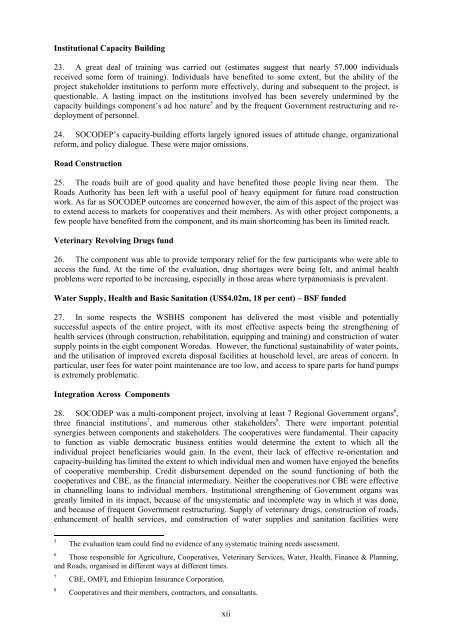Ethiopia SOCODEP CE - main report - IFAD
Ethiopia SOCODEP CE - main report - IFAD
Ethiopia SOCODEP CE - main report - IFAD
Create successful ePaper yourself
Turn your PDF publications into a flip-book with our unique Google optimized e-Paper software.
Institutional Capacity Building<br />
23. A great deal of training was carried out (estimates suggest that nearly 57,000 individuals<br />
received some form of training). Individuals have benefited to some extent, but the ability of the<br />
project stakeholder institutions to perform more effectively, during and subsequent to the project, is<br />
questionable. A lasting impact on the institutions involved has been severely undermined by the<br />
capacity buildings component’s ad hoc nature 5 and by the frequent Government restructuring and redeployment<br />
of personnel.<br />
24. <strong>SOCODEP</strong>’s capacity-building efforts largely ignored issues of attitude change, organizational<br />
reform, and policy dialogue. These were major omissions.<br />
Road Construction<br />
25. The roads built are of good quality and have benefited those people living near them. The<br />
Roads Authority has been left with a useful pool of heavy equipment for future road construction<br />
work. As far as <strong>SOCODEP</strong> outcomes are concerned however, the aim of this aspect of the project was<br />
to extend access to markets for cooperatives and their members. As with other project components, a<br />
few people have benefited from the component, and its <strong>main</strong> shortcoming has been its limited reach.<br />
Veterinary Revolving Drugs fund<br />
26. The component was able to provide temporary relief for the few participants who were able to<br />
access the fund. At the time of the evaluation, drug shortages were being felt, and animal health<br />
problems were <strong>report</strong>ed to be increasing, especially in those areas where tyrpanomiasis is prevalent.<br />
Water Supply, Health and Basic Sanitation (US$4.02m, 18 per cent) – BSF funded<br />
27. In some respects the WSBHS component has delivered the most visible and potentially<br />
successful aspects of the entire project, with its most effective aspects being the strengthening of<br />
health services (through construction, rehabilitation, equipping and training) and construction of water<br />
supply points in the eight component Woredas. However, the functional sustainability of water points,<br />
and the utilisation of improved excreta disposal facilities at household level, are areas of concern. In<br />
particular, user fees for water point <strong>main</strong>tenance are too low, and access to spare parts for hand pumps<br />
is extremely problematic.<br />
Integration Across Components<br />
28. <strong>SOCODEP</strong> was a multi-component project, involving at least 7 Regional Government organs 6 ,<br />
three financial institutions 7 , and numerous other stakeholders 8 . There were important potential<br />
synergies between components and stakeholders. The cooperatives were fundamental. Their capacity<br />
to function as viable democratic business entities would determine the extent to which all the<br />
individual project beneficiaries would gain. In the event, their lack of effective re-orientation and<br />
capacity-building has limited the extent to which individual men and women have enjoyed the benefits<br />
of cooperative membership. Credit disbursement depended on the sound functioning of both the<br />
cooperatives and CBE, as the financial intermediary. Neither the cooperatives nor CBE were effective<br />
in channelling loans to individual members. Institutional strengthening of Government organs was<br />
greatly limited in its impact, because of the unsystematic and incomplete way in which it was done,<br />
and because of frequent Government restructuring. Supply of veterinary drugs, construction of roads,<br />
enhancement of health services, and construction of water supplies and sanitation facilities were<br />
5 The evaluation team could find no evidence of any systematic training needs assessment.<br />
6 Those responsible for Agriculture, Cooperatives, Veterinary Services, Water, Health, Finance & Planning,<br />
and Roads, organised in different ways at different times.<br />
7 CBE, OMFI, and <strong>Ethiopia</strong>n Insurance Corporation.<br />
8 Cooperatives and their members, contractors, and consultants.<br />
xii

















